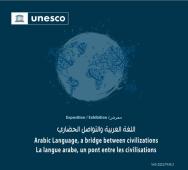
Prince Sultan Bin Abdulaziz Al Saud Programme for the Arabic Language
For centuries, the Arabic language has played a major role in connecting societies and promoting cultural, scientific, and intellectual growth. As one of the most widely spoken languages in the world and one of the six official languages of the United Nations, the Arabic language perpetually shapes knowledge and values, and enables dialogue globally.
in this regard, in 2016, UNESCO launched a programme to strengthen the use of Arabic language in UNESCO, with the support of the Sultan Bin Abdulaziz Al Saud Foundation.

Arabic plays a major role in promoting social cohesion, knowledge production and spreading the values of peace and mutual understanding. Its contribution to humanity cannot be reduced to one people, as it is a civilization’s legacy for the entire world.

Key Facts and Figures
Check the facts below to discover the rich and diverse history of the Arabic language and its impact around the world today

can be traced back to the Arabian Peninsula well over 1000 years ago

are native Arabic speakers

is inscribed on UNESCO’s Intangible Heritage list

many dialects used by millions of people in the Arab region and beyond

of the six official languages of the United Nations

for over 50 languages currently spoken around the world

made their ground-breaking discoveries in Arabic

News & Stories
Events
About the Programme
In recognition of the global importance of the Arabic language, on 18 December 1973, the United Nations General Assembly included Arabic among its official and working languages. As the lead United Nations agency for the safeguarding and promotion of multilingualism, over the years UNESCO has remained committed to promoting the Arabic language as a bridge between people, cultures and across borders.
For this reason, on 15 December 2016, UNESCO signed a partnership agreement with the Sultan Bin Abdulaziz Al Saud Foundation to launch the Prince Sultan Bin Abdulaziz Al Saud Programme for the Arabic language.
Through this programme, UNESCO seeks to enhance the use of Arabic at UNESCO, to build a better understanding of the contribution of Arabic language and culture to the world, and to promote linguistic diversity and intercultural dialogue.

Through its interaction with various languages, Arabic enriches dialogue by bringing points of view closer, and addressing differences.
Partner
The Sultan Bin Abdulaziz Al-Saud Foundation is a non-profit organization based in Saudi Arabia. The foundation participates in a broad range of projects from health care and charitable housing to the advancement of natural and social sciences. The Foundation has engaged considerably in the promotion of the Arabic language to strengthen global intercultural dialogue and cohesion.
A five-year strategic partnership between UNESCO and the Sultan Bin Abdulaziz Al-Saud Foundation was signed in 2016 for USD 5 million. The Foundation’s generous contribution has helped UNESCO put in place an extensive list of activities, events, and publications promoting Arabic to its rightful place as a global language-a language of diversity and peace uniting us all.

Main Pillars

Enhance the production of state-of-the-art knowledge in Arabic

Support content development and contribute to linguistic diversity in the digital world

Develop skills and encourage the exchange of the best practices in Arabic

Promote and diversify the contribution of Arabic language and culture to humanity

Other Resources
- UNESCO World Atlas of Languages in Arabic - The World Atlas of Languages addresses a growing need to protect language resources and empower communities by collecting data and monitoring global linguistic diversity. Its Arabic version was designed in response to the resource scarcity of this language in cyberspace.
- UNESCO Thesaurus in Arabic - The repository of UNESCO’s institutional memory and a source of high-quality information on UNESCO activities with more than 350,000 documents dating back to 1945.















